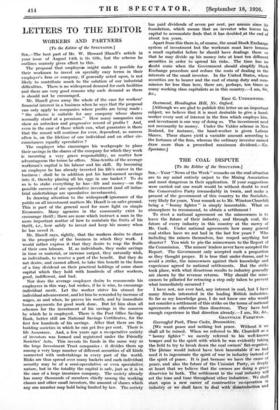LETTERS TO THE EDITOR
WORKERS AND PARTNERS [To the Editor of the SPECTATOR.] SIE,—The best part of Mr. W. Howard !Hazell's article in your issue of August 14th is its title, but the scheme he outlines scarcely gives effect to this.
The proposal that employers might make it possible for their workmen to invest on specially easy terms in their employer's firm or company, if generally acted upon, is not likely to contribute much to the solution of our industrial difficulties. There is no widespread demand for such facilities and there are very good reasons why such demand as there is should not be encouraged.
Mr. Hazel! gives away the whole of the case for workers' financial interest in a business when he says that the proposal can only apply to companies where profits are being made : " the scheme is suitable for any company whose shares normally stand at a premium." How many companies can show an unbroken and progressive record of profits ? And, even in the case of those which can, what guarantee is there that the record will continue for ever, dependent, as success often is, on the lifetime of one individual and on other cir- cumstances equally speculative ?
The employer who encourages his workpeople to place their savings in the shares of the company for which they work is incurring a very grave responsibility, no matter how advantageous the terms he offers. Nine-tenths of the average workman's capital is his labour and his skill. By becoming an employee he has already invested his life's career in the business : shall he in addition put his hard-earned savings into it, thereby placing all his eggs in one basket ? To do so is to stake everything he has—life and money—on the possible success of one speculatiVe investment (and all indus- trial undertakings are speculative investments).
In drawing attention to the widespreadt ignorance of the public on all investment matters Mr. Hazen is on safer ground. This is part of the general need for more light on simple Economics. Many agencies in the community exist to encourage thrift ; there are none which instruct a man in the More important matter of how to maintain the fruits of his thrift, i.e., how safely to invest and keep his money when he has saved it.
Mr. Hazell says, rightly, that the workers desire to share in the prosperity of the business in which they work. I would rather express it that they desire to reap the fruits of their own labours. If, as individuals, they make savings in time or material, or increase output, they naturally wish, as individuals, to receive a part of the benefit. But they do not desire, and cannot afford, to take this benefit in the form of a tiny dividend on their practical holdings of some share capital which they hold with hundreds of other workers, good, indifferent, and bad.
Nor does the average employer desire to remunerate his employees in this way, but wishes, if he is wise, to encourage individual merit. Let the worker strive his utmost for individual advancement, and let him be rewarded by increase of wages, as and when, he proves his worth, and by immediate bonus payments for good work done. But let him shun all schemes for the investment of his savings in the concern by which he is employed. There is the Post Office Savings Bank, better still are National Savings Certificates, for the first few hundreds of his savings. After that there are the building societies in which he can get five per cent. There is life Assurance. And, a few years ago a co-operative society of investors was formed and registered under the Friendly Societies' Acts. This invests its funds in the same way as the large Investment Trust companies : it divides them up among a very large number of different securities of all kinds connected with undertakings in every part of the world. Risks are thus spread over many baskets and each individual security may be of a semi-speculative or even speculative. nature, but in the totality the capital is safe, just as it is in' the case of a large insurance company. The society already has many thousandi of members chiefly among the "working" classes and other small investors, the amount of shires which- any one member may hold being limited by law. The society has paid dividends of seven per cent. per annum since its foundation, which means that an investor who leaves his capital to accumulate finds that it has doubled at the end of about ten years.
Apart from this there is, of course, the usual Stock Exchange system of investment but the workman must have become a small capitalist before he should have dealings there so that he may divide up his money into at least ten different securities in order to spread his risks.. The time has no doubt conk when the GovernMent should simplify Stock Exchange procedure and reduce the costs of dealing in the interests of the small investor. In the United States, where securities are to bearer and the cost of stamp duty and com- mission far less than here, there are, perhaps, ten times as many working class capitalists as in this country.—I am, Sir, &c.,
ERIC G. UNDERWOOD.
Overmead, Headington lull, Nr. Oxford.
[Although we are glad to publish this letter on an important subject, we believe that it is most desirable to give a hand- worker every sort of interest in the firm which employs him, and investment is one way of doing so. The investment need not necessarily be money. Under the Valder scheme in New Zealand, for instance, the hand-worker is given Labour Shares. These shares yield a variable amount according to the fortunes of the firm, whereas the ordinary investor cannot draw more than a prescribed maximum dividend.—En. Spectator.]






























































 Previous page
Previous page